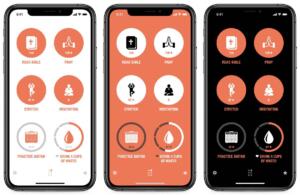Eight Ways to Form a New Habit, According to Science
- Smart small—Give yourself realistic, achievable goals to build momentum and confidence. Don’t overwhelm yourself with goals that will almost certainly cause you to fail—and then quit altogether. If you want to start running, begin with 10 minutes and add increments of two minutes per session. Small wins have proved to motivate, whereas failure to meet an unattainable goal will do the exact opposite.
- Make it easy—In the same vein, don’t make your goals so hard that they can’t fit into your existing life. Habits are most likely to stick when they don’t involve huge speed bumps. Take small bites that fit with your schedule, budget, profession and family life.

- Get an accountability buddy—Although it is number three on the list, this tip might be the most important because it is based on the power of positive peer pressure. Once you verbalize your goals to another person, you are 10 times more likely to stick to them. From beginning to work out to quitting smoking, if someone is checking on your progress, chances are you will remember them before turning away from your goals.
- Remove temptation—Stack the chips in your favor. Don’t create unnecessarily hard situations for yourself. Don’t keep the temptation items in your space that could cause you to backslide on your goals.
- Tie it to an existing habit—Chances are you already have a few good habits. So build on that knowledge. If you already work out on a regular basis, commit to drinking extra water while doing so, for example.

- Don’t rely on willpower—Willpower is strong but not infallible. Set up as many systems in your life as possible that don’t require willpower. For example, prepare your food for the day ahead of time, pack your workout bag the night before, set timers and alerts on the devices you want to use less.
- Understand the habit cycle: cue, craving, response and reward—Know that most habits are part of a much bigger cycle. Identify the cues in your life that trigger you to rely on bad habits. Identifying them is the first step in removing or conquering them.
- Commit to 30 days—Thirty days has been identified by many behavioral scientists as the key time frame for breaking habits. It’s manageable but significant. If you want to give something up but aren’t sure how, give it a month and then see how you feel.
Habit Planners
Planning out your time can be helpful for changing habits. Try these tools to build better habits:
- 2022 Power of Habit Planner: A 12-Month Productivity Organizer to Master Your Habits and Change Your Life
- The Power of Habit: Why We Do What We Do in Life and Business
- Habits: A 12-Week Journal to Change Your Habits, Track Your Progress, and Achieve Your Goals

Habit Apps
– Streaks
– Grow—Habit tracking
– Goalify
– HabitBull—Change your iPhone habits


